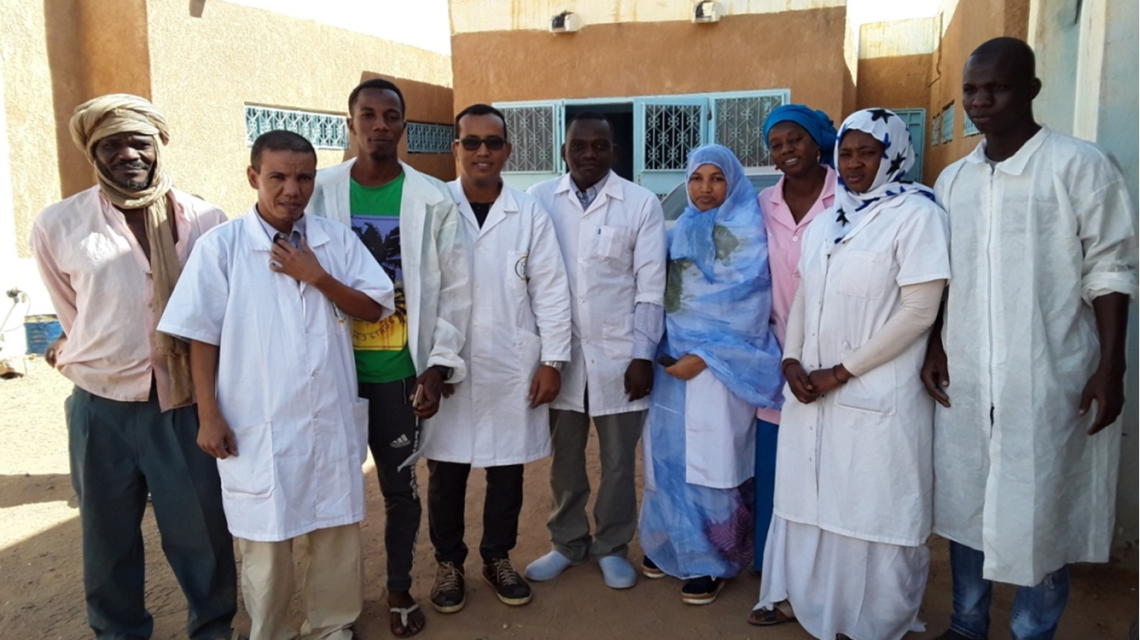As part of its efforts to support early childhood nutrition and maternal health, last year, Mauritania's Ministry of Health conducted an evaluation of exclusive breastfeeding promotion activities through its National Public Health Research Institute (INRSP), with the support of the IAEA and UNICEF.
Breastfeeding has benefits for both mothers and their children, and isotopic techniques are used to provide information on breastfeeding rates. "Women who breastfeed are more likely to recover from childbirth more quickly, and their risk of ovarian and breast cancers are reduced. Breastfeeding also protects children from the risk of infections and diarrhoea," explained Mahfoudh Ould Mohamed El Agheb, Head of the Nutrition Laboratory at Mauritania's National Public Health Research Institute (INRSP). "Therefore, the promotion of exclusive breastfeeding is considered a priority objective of the Mauritanian Ministry of Health."
Organized with the support of the Agency's technical cooperation (TC) programme[1], the collaborative study assessed the exclusive breastfeeding rate among nursing mothers in two categories: Communities in Mauritania that had benefitted from UNICEF awareness-raising campaigns, and those yet to benefit from such promotional efforts. Conducted over a period of two months, the study findings have provided data-backed evidence of the success and effectiveness of breastfeeding awareness-raising campaigns. The study was conducted using isotopic techniques to measure breastfeeding rates rather than rely on self-reported feedback from mothers.

The IAEA-supported study was designed to designed to assess the breastfeeding practices of Mauritanian mothers, six months after the child's birth, to determine the amount of breast milk and water from sources other than breast milk consumed by babies per day. (Photo: INRSP)
"The deuterium oxide dose-to-mother technique provides a non-invasive method to objectively measure the amount of breast milk consumed by the infant. This measurement can be also used to assess the exclusivity of breastfeeding, and thus the impact of breastfeeding promotion campaigns," said Alexia Alford, a Nutrition Specialist at the IAEA.
The Mauritanian study, involving 86 mother-baby pairs, used this stable isotope technique to discover that the rate of exclusive breastfeeding was almost double in the intervention areas, as compared to the control areas-49 per cent versus 24 per cent. Additionally, in the intervention zones, infants were shown to have consumed larger quantities of breast milk, had better nutritional status, and suffered less from illness.
"The study shows clearly that the joint actions of Mauritania's Ministry of Health and UNICEF have had a positive impact on both local breastfeeding practices and on the nutritional status of children and mothers, thus improving their global health," said Khalid EL-Kari, Head of Nutrition and Food Services at Morocco's National Centre for Energy and Nuclear Science and Technology (CNESTEN), who supported the project's field work and analysis.
The study also showed that the prevalence of the various forms of malnutrition was significantly lower in the intervention areas. Children from the intervention zone also visited health facilities less frequently following an illness than children from the control zone.
"For more than 10 years, we have been conducting SMART nutrition surveys with a 24-hour recall component for infant and young child feeding practices (IYCF). This evaluation using stable isotope methodology is a great opportunity for us to corroborate our results and reinforce our achievements," said Mohamed Baro, Nutrition Specialist at UNICEF-Mauritania.
The field implementation of the study was funded by the UNICEF Country Office, while the IAEA procured and provided equipment, isotopes, supplies, training and expert missions. Central to the success of the project, the Regional Designated Centre in Nutrition-Joint Research Unit in Nutrition, Health and Environment at the Universite Ibn Tofail de Kenitra and CNESTEN in Morocco-supported the INRSP team in Mauritania through training and expert guidance.
[1] MAU6006, 'Using Deuterium-Labelled Water Dilution Technology to Assess the Impact of a Programme to Promote Infant and Young Child Nutrition (IYCN) Practices'






